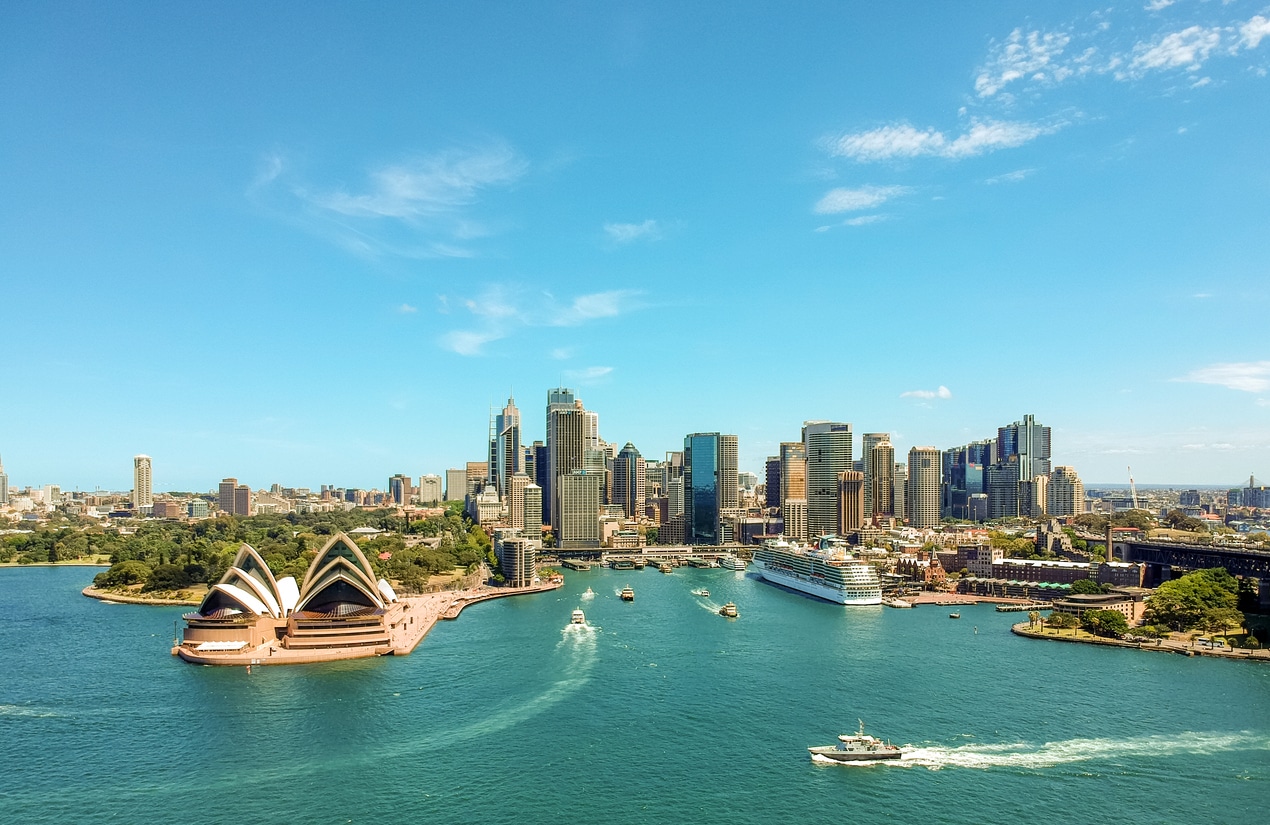From sun-drenched beaches to cities obsessed with good coffee, it’s no wonder U.S. expats (and plenty of renters) are eyeing real estate in Australia. Whether you’re dreaming of a family home, a Sydney apartment, or dipping into commercial property, the Aussie market has options for every taste.
Sydney and Melbourne top the charts for big-city buzz (and big price tags), while Queensland offers more space and better value, all with that classic Aussie lifestyle. No wonder Australia’s property market keeps turning heads—surfboard optional.
📋 Key Updates for 2025
- Temporary ban on foreign buyers purchasing established homes applies nationwide from April 1, 2025 to March 31, 2027, with limited exceptions for redevelopment.
- FIRB application fees and annual land tax surcharges have increased, with surcharges now at 5% in NSW, 4% in VIC, and 3% in QLD.
- New ATO audit focus and doubled penalties target vacant or land-banked properties left idle for more than six months.
Can U.S. citizens buy real estate in Australia?
Good news for homesick Americans with a soft spot for sunshine: yes, U.S. citizens can buy real estate in Australia. But before you start bidding on that Queensland beach house, there are a few hoops to jump through.
First, foreign buyers need approval from the Foreign Investment Review Board (FIRB). The FIRB rules are there to keep the market fair and make sure there’s enough housing for Aussies, too. Here’s what to expect:
- What can you buy? Foreigners can generally buy new homes, off-the-plan properties, or vacant land to build. Buying established (second-hand) homes is usually only allowed if you plan to knock down and rebuild, or if you’re moving in as a temporary resident.
- Commercial property: Buying offices, shops, or warehouses? The rules are a bit more flexible, but you’ll still need FIRB approval.
- Rental properties and company ownership: Non-residents can buy rental properties under certain conditions, and some use a “Pty Ltd” company to own property. Just know: rules for non-residents are strict, and tax implications can get complicated fast.
Every state—including New South Wales (NSW), Victoria (VIC), and Queensland (QLD)—follows these national guidelines, so the basics apply whether you’re house-hunting in Melbourne or dreaming big in Brisbane.
Bottom line: U.S. expats can absolutely join the Australian property game, but you’ll want to do your homework—and maybe get a good local advisor—before diving in.
Hotspots and market trends: Sydney, Melbourne, Gold Coast, and beyond
Australia’s real estate market is famously diverse, with every region offering its own property personality, price tag, and perks.
- Sydney and Melbourne: These are the heavyweights—think sky-high prices, lively auctions, and a strong apartment culture (unless you have a small fortune for a house with a backyard). They’re hubs for careers, coffee, and culture, but be ready for serious competition.
- Brisbane and Gold Coast: Queensland is having a moment. Brisbane is popular with families and continues to grow, while the Gold Coast mixes surf-town charm with modern, resort-style apartments and plenty of sunshine. Both cities offer more space and better value than the southern capitals.
- Canberra and Adelaide: Canberra is steady, with stable prices, good schools, and plenty of green space. Adelaide offers a slower pace, lower prices, and an impressive selection of classic homes—perfect if you’re after character and calm.
- Perth and regional areas: Perth (on the west coast) is known for its beaches and more relaxed pace. Beyond the capitals, regional New South Wales, Victoria, and Queensland deliver lifestyle towns, vineyards, and even affordable family homes—just expect to search a little longer for the right fit.
Wherever you land, there’s an Australian property market to suit your lifestyle—if you know where (and how) to look.
💡 Pro Tip:
realestate.com.au makes it easy to compare property prices and types in different cities or regions, whether you’re after an apartment, new build, or commercial space.
The buying process: How it works, step by step
Buying real estate in Australia comes with its own set of rules—and a few surprises. Here’s how it typically plays out for U.S. expats:
Step 1: Research the market
Jump on realestate.com.au or domain.com.au to browse listings in Sydney, Melbourne, Brisbane, Perth, Adelaide, Canberra, or your favorite regional spot. Get a feel for prices, neighborhoods, and what your budget will get you.
Step 2: Line up your team
Find a reputable real estate agent—they’ll guide you through local customs, arrange property viewings, and help you understand the market. You might also want to chat with a mortgage broker early if you need financing.
Step 3: Inspect properties
Schedule viewings (in person or virtual), ask questions, and take your time. In Australia, buyers often get their own building and pest inspections before making an offer.
Step 4: Make an offer (or prepare for auction)
- For private sales: Submit a written offer through your agent, along with proof of ID and contact details.
- For auctions: Register to bid, bring your phone number and ID, and prepare for some fast-paced action—many homes in Sydney and Melbourne are sold this way.
Step 5: Finalize the deal
If your offer is accepted, you’ll sign a contract and pay a deposit (usually 10%). Then your legal representative (“conveyancer”) checks all the paperwork.
Step 6: Settle up and move in
Pay the remaining balance, cover stamp duty and legal fees, and the property is officially yours. Keys, sunshine, and maybe a congratulatory flat white await.
A few costs to remember
- Agent commissions (usually paid by the seller)
- Legal/conveyancing fees
- Stamp duty (a state-based property tax)
- Inspection costs
💡 Pro Tip:
Buying a home or investment property in Australia can move quickly, especially in big cities—so it pays to be prepared and ask plenty of questions along the way.
How much does it really cost?
It’s easy to fall in love with real estate in Australia—until the invoices start rolling in. From upfront purchase fees to ongoing bills and taxes, it pays to know exactly what you’re signing up for before you start bidding.
Upfront costs
Be prepared for a handful of big-ticket expenses that come with every Aussie property purchase. Budgeting for these can help you avoid unpleasant surprises on settlement day.
- Stamp duty: A government tax on property purchases—often tens of thousands, depending on the price and location. Each state has its own rates and calculators.
- Legal fees and conveyancing: Expect to pay for a lawyer or conveyancer to handle contracts and paperwork.
- Buyer’s agents: Optional, but some expats find it worth the fee (usually 1–2% of the purchase price) for local know-how.
- Home prices: Sydney and Melbourne remain Australia’s priciest cities, while Brisbane, Adelaide, Perth, and Canberra offer more affordable options—but prices everywhere have climbed in recent years.
Ongoing expenses
Buying a property is only the beginning—there are plenty of regular bills to consider once you’ve settled in. From council rates to power bills, these costs can add up quickly and often catch new homeowners (and even seasoned investors) off guard.
- Council tax (rates): Local government charges to cover rubbish, roads, and community services.
- Utilities: Electricity, water, gas, and internet—costs vary widely depending on city and property size.
- Property management fees: If you’re buying a rental property or commercial real estate, expect ongoing management costs.
Tax tips for U.S. buyers
Navigating two tax systems at once can feel like a full-time job for American expats with real estate in Australia. Understanding your obligations on both sides of the Pacific can save you money—and plenty of headaches—when tax season rolls around.
- Land tax: An annual charge for property owners (but usually doesn’t apply to your main home).
- Capital gains tax: If you sell at a profit, Australia will want its cut—so will the U.S., though the tax treaty can help avoid double taxation.
- Don’t forget the IRS: American expats must report foreign property and any rental income on their U.S. tax return.
And as for the “great Australian dream”? Rising prices mean owning a family home isn’t as easy as it once was, especially in the big cities. But with smart planning (and maybe a little patience), it’s still within reach for many expats and locals alike.
Mortgages and financing for expats
Getting a mortgage as a U.S. expat in Australia is possible, but it comes with a few twists. Most banks and lenders in states like VIC, NSW, and QLD are open to working with foreign buyers, but you’ll notice the process is a little more involved than back home.
Documentation and income
Be ready to share plenty of paperwork, including your local phone number, proof of identity, and evidence of your income. If you’re paid in U.S. dollars, some lenders will consider it—others may want to see funds landing in an Australian account.
Deposit and lending criteria
Expats are typically asked to put down a larger deposit—often 20% or more. The deposit amount and approval process may also change depending on whether you’re buying a family home, an investment property, or something commercial.
Credit history
Australian lenders may take a peek at your U.S. credit report, but your local credit history will carry more weight. If you’re new to Australia, expect to provide extra references or financial documentation to help your application along.
Working with a broker
Mortgage rates and rules change regularly, and some banks are far more “expat-friendly” than others. A mortgage broker who understands expat buyers can help you navigate your options, find competitive rates, and simplify the paperwork.
While financing has become more competitive, a little patience and the right help can put Australian property ownership within reach for U.S. expats.
💡 Pro Tip:
Start building your Australian credit history as soon as you arrive—open a local bank account, use an Aussie credit card if you can, and pay bills on time. It’ll make getting approved for a mortgage much smoother when you’re ready to buy.
Make your Aussie real estate move with confidence
From sprawling Queensland beaches to the buzz of Sydney and Melbourne, it’s easy to see why so many U.S. expats dream of owning real estate in Australia. The property market might throw a few curveballs, but with a little know-how, you can find your place in the sun—without losing your mind over fine print.
Before you dive in, don’t forget the tax side. Bright!Tax specializes in helping U.S. expats navigate the paperwork, deadlines, and reporting rules that come with buying, selling, or investing Down Under. Reach out before you make your move—we’ll handle the IRS, you handle the house hunting.
Frequently Asked Questions
-
Can U.S. citizens really buy property in Australia?
Yes! U.S. citizens can purchase real estate in Australia, but you’ll need Foreign Investment Review Board (FIRB) approval if you’re not a permanent resident or citizen. There are some restrictions on what types of properties you can buy, especially if you’re not planning to live there full time.
-
Do I need to be in Australia to buy property?
No, you can purchase property from abroad, but you’ll need a good local team—usually a real estate agent, solicitor (or conveyancer), and sometimes a buyer’s agent—to help with inspections, paperwork, and negotiations.
-
How much deposit do I need as a U.S. expat?
Most lenders ask for at least a 20% deposit from non-resident buyers. Some may require more, especially for investment or commercial properties.
-
Will my U.S. credit history help me get a mortgage in Australia?
Maybe, but not always. Australian banks put more weight on your local credit history and financial activity. Starting to build credit in Australia early can make a big difference.
-
What taxes do I need to worry about?
Expect to pay stamp duty when you buy, annual council rates, and possibly land tax if you own more than one property. You’ll also need to report foreign property and income to the IRS, and may owe U.S. taxes on gains or rental income.
-
Can I rent out my property if I’m not living in Australia?
Usually, yes—but check local and federal regulations, and be sure you understand the tax and reporting requirements in both countries.

 Connect on LinkedIn
Connect on LinkedIn

